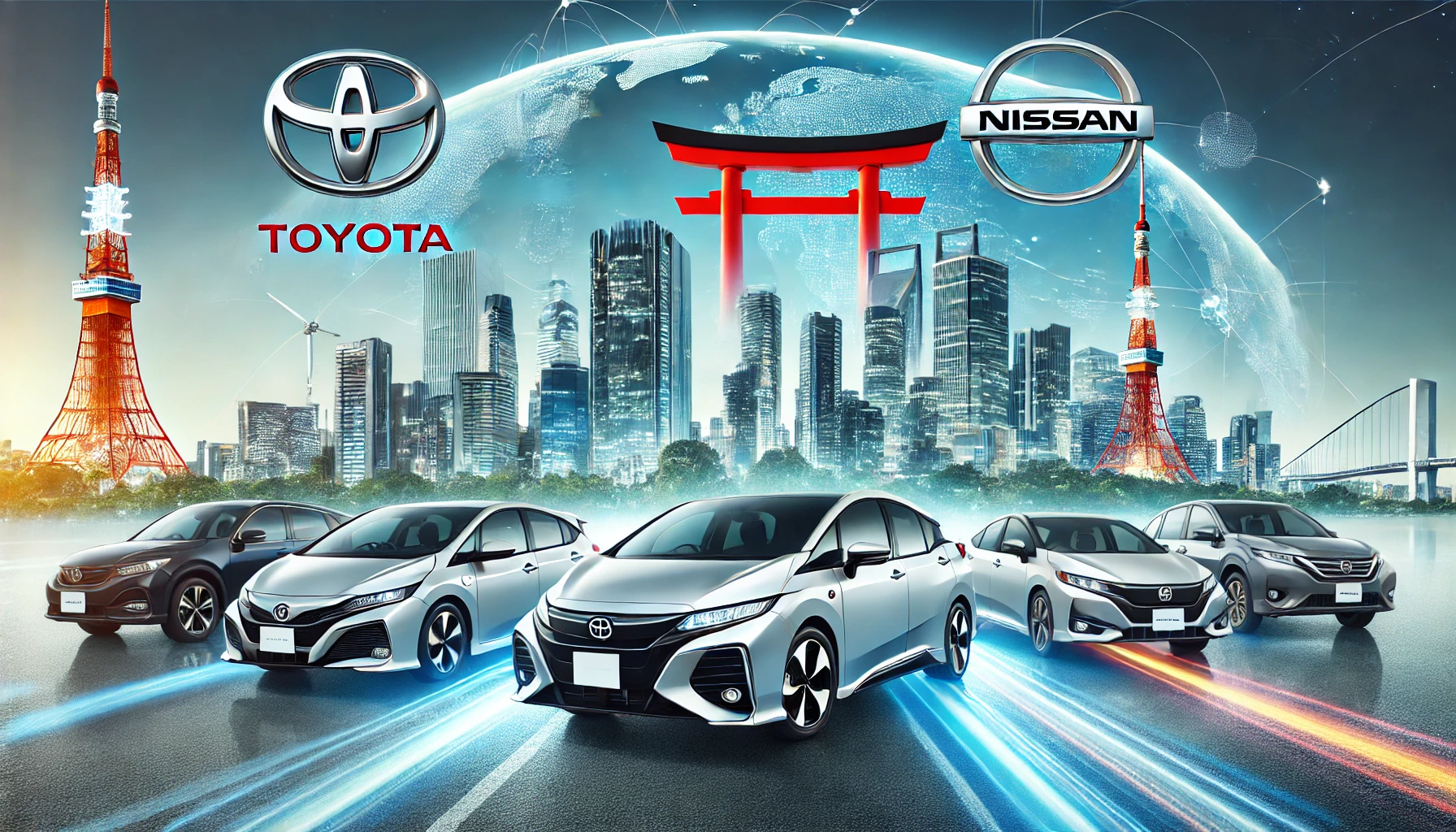The Automotive Industry of Japan: History, Innovation, and Future Trends
Automotive Industry of Japan, One of the largest and most important automobile industries in the world is found in Japan. One of the top three auto-producing nations in the world, Japan is renowned for its manufacturers’ skill, dependability, and creativity.

Japan’s Automotive Industry: Innovation and Global Leadership
The automotive industry of Japan is renowned for its innovation, fuel efficiency, and advanced technology. Leading Japanese car manufacturers like Toyota, Honda, and Nissan have revolutionized the global market with cutting-edge developments in hybrid vehicles, electric cars, and driver-assistance technology. Toyota’s hybrid cars, such as the Prius, set the foundation for eco-friendly transportation, while Nissan pioneered electric vehicles (EVs) with the Leaf, one of the world’s best-selling EVs. Meanwhile, Honda continues to push boundaries with hydrogen fuel cell vehicles and fuel-efficient engines. As the Japanese car market shifts towards sustainability, the industry faces challenges from Tesla and Chinese EV manufacturers. However, with a strong focus on automotive technology, fuel efficiency, and innovation in cars, Japan remains a key player in shaping the future of mobility.
History and Development:
In the 1960s, Japan became a global leader in mass-market automobile production thanks to the rise of brands like Toyota, Honda, and Nissan. They had a major competitive advantage because of their emphasis on effective production techniques and ongoing improvement, which is reflected in ideas like the Toyota Production System. Their popularity was further fueled by a concentration on fuel efficiency and cutting-edge technologies, particularly in the wake of the 1970s oil crisis.
Current Landscape
Today, Japan remains a powerhouse for car manufacturing and exports. Some of the most iconic Japanese automotive brands include:
1. Toyota:
Toyota was established in 1937 and has expanded to become the largest carmaker in the world based on volume. It is well-known for producing dependable, economical, and useful cars. The Toyota Production System, which emphasizes continual improvement, is largely responsible for the company’s success. Waste minimization, effective production techniques, and a culture of quality control are prioritized in this system.
In addition to its primary business of making automobiles, Toyota is a pioneer in the field of hybrid electric vehicles, with the renowned Prius setting the standard. The business is demonstrating its dedication to long-term sustainable transportation solutions by making significant investments in electric vehicle technology and striving to become carbon neutral by 2050.
2. Honda:
In 1948, Honda started as a tiny engine repair shop in Japan. The company’s founder, Soichiro Honda, had an unwavering desire to innovate and improve. This resulted in the development of the renowned “Super Cub” motorcycle in 1958, which went on to become the best-selling car in history and cemented Honda’s standing as a significant force in the world of transportation.
Honda is renowned for its commitment to innovation, durability, and fuel efficiency and is still a significant participant in the automobile and motorbike sectors today. They are the biggest motorbike manufacturer in the world and consistently rank among the top automakers globally. Innovative technologies like the VTEC engine, which maximizes power and economy, and the Honda Sensing suite of driver-assistance systems, which increases safety and enhances driving pleasure, are the result of Honda’s dedication to research and development.
3. Nissan:
Nissan Motor Company is a well-known Japanese multinational automaker that was founded in 1933. It has established a name for itself in the international market because of its reputation for innovation and technological focus. The company is well-known for producing feature-rich, fuel-efficient cars that appeal to a wide spectrum of consumers.
Nissan made a significant impact on the automotive industry with the introduction of the Leaf, the first mass-produced electric vehicle in history, in 2010. This ground-breaking initiative maintained Nissan’s position as a leader in the development of electric vehicles. Also continues to be a popular choice among environmentally conscious drivers. Nissan provides a wide range of electric vehicles along with cars, SUVs, and trucks. Nissan’s product lineup, which includes the popular little hatchback Versa and the powerful and sumptuous Nissan GT-R, showcases the company’s versatility and commitment to satisfying a wide range of driving needs and preferences.
Other notable brands: Mazda, Mitsubishi, Subaru, and Suzuki
Innovation & Technology:
Japanese automakers are known for pushing the boundaries of innovation:
- Hybrid Technology: Toyota was the first to offer hybrid cars, which combine petrol engines and electric motors to reduce pollution and boost fuel efficiency, with the Prius.
- Hydrogen Fuel Cell Vehicles: Companies like Toyota and Honda are investing in vehicles powered by hydrogen fuel cells.
- Advanced Driver-Assistance Systems (ADAS): Modern safety and driver-assistance features, such as automated emergency braking. Also, lane departure warnings, are frequently seen in Japanese vehicles.
Challenges and Future
The Japanese automotive industry faces challenges too:
- Competition: South Korean, European, and American automakers pose constant pressure.
- Declining Domestic Market: As Japan’s population ages, the country’s auto market is contracting. Foreign market expansion is becoming a greater priority for automakers.
- Shift to Electric Vehicles: Even while Japanese businesses have made progress in the EV sector. It will be difficult to overtake Chinese rivals and corporations like Tesla.
Future Prospects of Japan’s Automotive Industry
The automotive industry of Japan continues to evolve with groundbreaking advancements in automobile technology and a commitment to sustainable transportation. Japanese car manufacturers like Toyota, Honda, and Nissan are at the forefront of innovation, focusing on fuel efficiency, hybrid cars, and electric vehicles (EVs) to reduce environmental impact.
Looking ahead, Japan aims to strengthen its position in the global car market by investing in self-driving cars, hydrogen fuel cell vehicles, and advanced driver-assistance systems (ADAS). As vehicle production shifts towards cleaner energy solutions, Japan’s automotive exports are expected to remain strong, competing with rising players in the EV market, such as Tesla and Chinese automakers.
With a rich legacy in car manufacturing, a focus on top automakers in Japan, and continuous improvements in fuel-efficient vehicles, Japan is set to play a crucial role in shaping the future of mobility worldwide.
The future of the Japanese automobile industry looks bright, notwithstanding these obstacles. Their steadfast devotion to innovation, prioritization of quality, and endorsement of sustainable technologies guarantee their sustained significance in the worldwide automotive domain.


